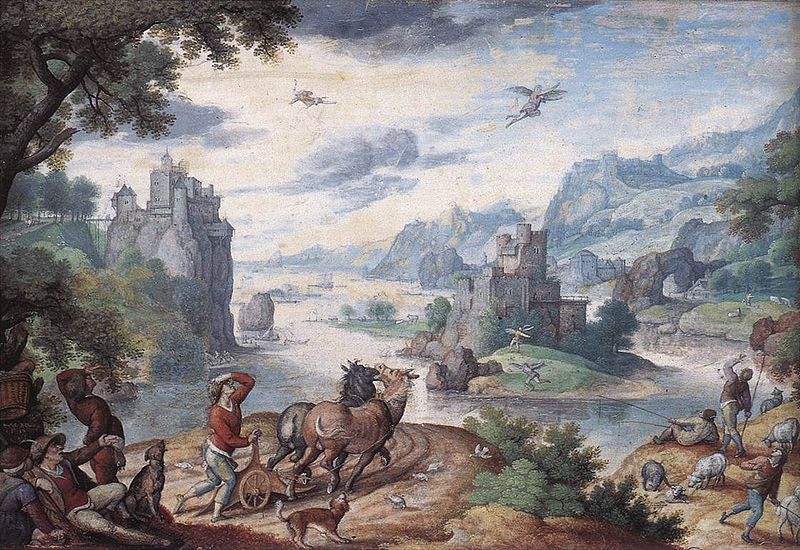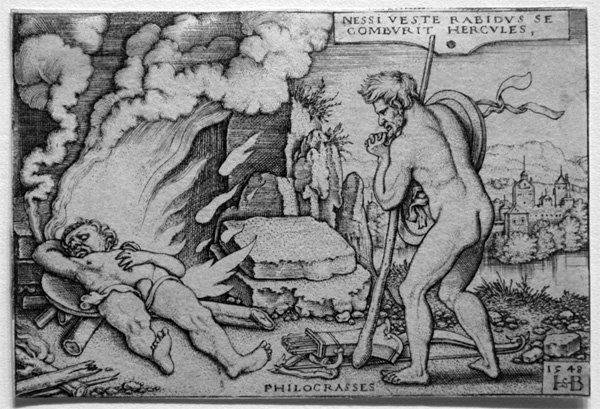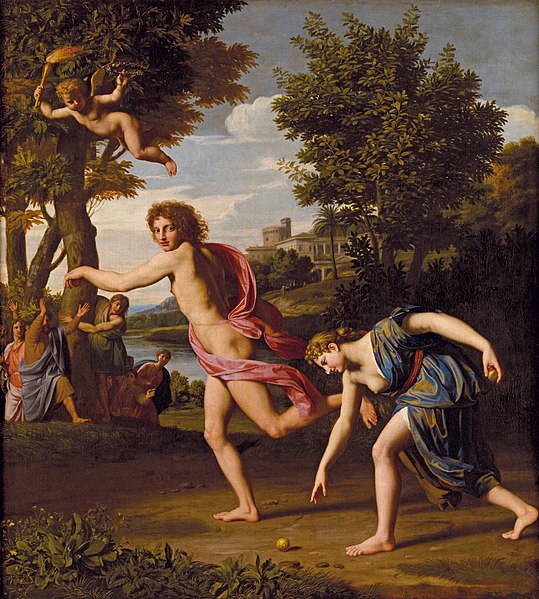Daedalus and Icarus:
This story tells how Daedalus is a known inventor, and has been exiled to an island. He devises an escape plan for he and his son, Icarus. He knows that escaping on land or sea is impossible, so he creates two makeshift sets of wings with wax as the binding. Prior to taking off into the air, Daedalus warns Icarus from flying too high or too low. Once in flight Icarus became careless, began to fly too high, and consequently the wax began to melt. Icarus ends up falling to the ocean, and drowns because he did not head his father's warnings.

(Landscape with the Fall of Icarus, Hans Bol: WikiCommons)
This story caught my attention because it tells about a humble couple who pleased the gods Jupiter (Zeus) and Mercury (Hermes). The gods had decided to build a temple in an inhabited swamp. They knocked one each door to test the households' kindness, and was turned away from all expect Philemon and Baucis. The couple did all they could to politely serve their guests, and soon realized that they were catering to gods. In the end Jupiter and Mercury escort them out of the swamp, where the temple immediately is built. They told the couple they would grant them one wish. Philemon and Baucis reply with a request to be the priests of the new temple, and when it is time for them to pass they wish to do so together. This couple practically had nothing, resided in poverty, but did not ask for much more when they could have been granted anything.
Achelous, The Shirt of Nessus, & The Death of Hercules:
The first story is pertinent, since it tells the tale where the great Hercules wrestles Achelous, the river god, for the hand of the beautiful Deianira. Hercules eventually wins, and they are soon wed and journey to his home when they come across the River Euenus. Nessus, a centaur, offers to help the new bride across the river, but ends up taking her with intentions of rape. Hercules is quick to action and sends a poisonous arrow through the back of Nessus, killing him. As Nessus is dying he gives Deianira a blood soaked cloak as a "love token," and for some off reason she accepts it. The last story tells, after some time, a rumor floats around the household of Hercules that he has eyes for another woman. Deianira believes the rumor, remembers her previously gifted "love token," and sends a servant to deliver the item as a gift to Hercules. She is unaware the cloak contains the same poison that killed Nessus. Once Hercules places the shirt onto his body he is doomed. The poison immediately sears into his flesh, is unable to remove it, and he is in a great deal of agony. It is known that Hercules is a demigod, and that Jupiter (Zeus) is his father. Jupiter petitions to the gods that since he is a part of him, that he is part immortal, and that Hercules has passed all his trials and tribulations. He requests that they allow Hercules to enter Mount Olympus and take place among them, and they agree. In the mean time Hercules has chosen to end himself voluntarily and builds a pyre. He enters the fire and once his mortal self is burned away, leaving only his immortal being, Jupiter sends a chariot to retrieve him.

(Funeral of Hercules, Hans Sebald Beham: WikiCommons)
Birth of Hercules:
The story following the trilogy of Hercules life his mother, Alcmena, tells about his birth. She tells while being in labor for a consecutive week, she called upon the goddess of childbirth Lucina. She arrived but she had previously made a prior commitment, to Juno (Hera), to keep the child in the womb as long as possible. She has her hands placed in a clasp, over her knees, and this was symbolized as her "hold" on childbirth. Alcmena mentions a loyal servant, Galanthis, who decided to trick Lucina into allowing her master the ease of childbirth. She came to Lucina and told her to congratulate the lady on the birth on her new child. This surprised the goddess leaped from her spot, momentarily releasing her clasped hands, and Alcmena was able to give birth. Lucina soon realized that she had been tricked, and transformed Galanthis into a weasel. Since her lie had aided in the birth Galanthis, in weasel form, now is forced to proceed with childbirth through her mouth.
Atlanta and Hippomenes & The Foot-Race:
Atlanta was known for her ability to run faster than anyone around, and for her beauty. She was once told by a god that she should not seek a husband for it would change her. She tried to remain unmarried, but suitors would come after her persistently. She had told all of them that the only way she would be wed is if they were to beat her in a foot race, and if they happen to lose then they will have their life taken. Nonetheless suitors would flock from all areas. Once Hippomenes, grandson of Neptuene, came to see what all commotion was about. He, like the other men, soon was infatuated by Atlanta. He decided to challenge Atalanta in a race, but in concern that he would lose, he first visited Aphrodite. She agreed to help Hoppomenes, and gives him three golden apples. During the big race anytime Atalanta would be in the lead Hippomenes would throw an apple, and she would retrieve it. He eventually won and they were soon wed. After some time Aphrodite became angry that Hippomenes never thanked, or gave sacrifice for, her and came up with a scheme. When the newlyweds were on a journey, while resting, Aphrodite gave Hippomenes the sudden urge to make love to his wife. They were compelled to go through with the action and defiled a sacred temple. The god who the temple was devoted to then turned the couple into lions.

(Hippomenes and Atalanta, Nicolas Colombel:WikiCommons)
Greek mythology is also one of my favorite reading units! I think it is so interesting how they have gods and goddess for so many different things of nature. It's also interesting how animals are incorporated into the stories, such as in Hippomenes and Atalanta when they are turned into lions. The pictures that you chose go great with the readings you picked!
ReplyDelete